The Beginning
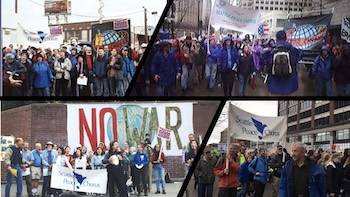
The Seattle Peace Chorus was inspired by Target Seattle, a region-wide activity formed to raise awareness about the growing threat of nuclear war. Because of her involvement in the effort to further dialogue about the nuclear threat, Helen Lauritzen felt a need to offer peace activists a way to communicate a positive vision of the future – a way to express musically their desire for peace. In Helen’s words: “This [the chorus] seemed like a way to do it joyously.” Helen’s leadership saw the establishment of the Seattle Peace Chorus over a three-month period, from January through March of 1983. Many members of the fledgling chorus had been active in Target Seattle, and brought friendships and a sense of community to the chorus. By reaching out through music and making personal connections, the chorus hoped to make a difference. Motley and musically ragged, the chorus was small and tentative. But it grew, both musically and in size. The early days were marked by hard work and by taking the risk to venture out. Faithful to the simplicity of its message, the chorus discovered and accepted the complexity of its mission.
In the words of founder Helen Lauritzen: “We didn’t think about concerts. We didn’t think of ourselves as a performing chorus. We didn’t sing that well! We built our musicianship over the years. There was always tension between mission and musicality! At first it was just people who wanted to sing. We sang at meetings of peace groups, at rallies, and for groups like Educators for Social Responsibility.
A remembrance from an original member, Anita Lenges, backs up Helen’s words.
“The first time we sang publicly was the going-away party for a group from Target Seattle who had collected petitions to present to the citizens of Tashkent, Seattle’s sister city. The petitions called for residents of Seattle and its sister city to work together to prevent nuclear war. We sang the evening the travelers got on the bus to go the airport, and the party was in the basement of St. Mark’s. We sang, ‘I Am but a Small Voice.’ That was in March 1983.”
The chorus performed its first concert in 1985, under the direction of founder Helen Lauritzen. The program offered a preview of songs for the upcoming trip to the former Soviet Union – the first of many trips for the chorus.
Subsequently, Seattle Peace Chorus began to travel for citizen-to-citizen diplomacy, to perform regular concerts based on themes of peace and justice, and to collaborate with other musical and non-profit groups. Over time, musicianship took on an importance equal to the mission of the chorus, since the best way to communicate through music is to sing beautifully.
Music Directors
Helen Lauritzen founded the chorus and led it from 1983 until 1997.
Mark Kloepper prepared the chorus for its first trip to Cuba in 1999, with Pamela Gerke assuming the role during the trip, since Mark got a school job just before we left for Cuba and had to leave Cuba early. Kloepper’s last concert with the chorus was in the spring of 2000, repeating repertoire that we had performed in Cuba.
Pamela Gerke was a member of SPC in the late 1990s. She chaired the travel committee for the first trip to Cuba in 1999, working closely with Steve Bauck. She stepped in and led us in a concert at the Grand Theater of Havana (in a small room, not the main auditorium). She also directed us for a concert in the spring of 2000 focused on our Cuba trip. After that she led the Seattle Women’s Ensemble.
Frederick N. West directed the chorus from the fall of 2000 to the spring of 2025.
We are pleased to announce that Will Rand will directing our 2025-2026 season.
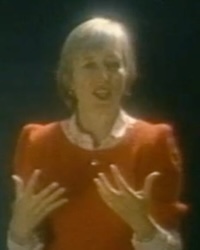
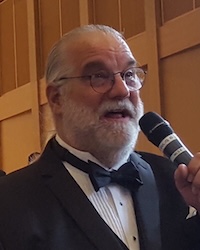
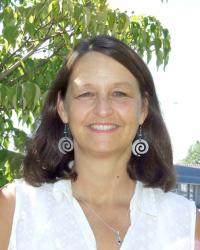
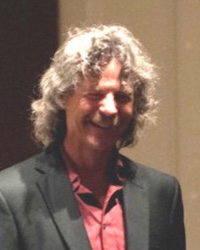
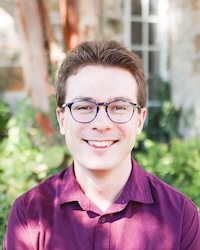
Travel
Seattle Peace Chorus has traveled twice to the Soviet Union, once to Russia after the dissolution of the USSR, twice to Chile, three times to Cuba, once to Venezuela, and three times to locations in the USA. Our trips have been well documented on our website. Start with our travel history page.
You might also be interested in Rebecca Johnson’s memories of the first trip to the Soviet Union, “Music Is a Bridge.”
Action Ensemble
From its inception under Helen Lauritzen in 1983, our chorus began as a committed smaller choir that sang to promote peace and social justice in ever larger venues, slowly becoming a larger concert chorus. Fred West, classically trained to lead formal orchestral and choral works, clearly brought even more of our focus to fine quality music. But, as always true within the SPC community, some members voiced concern that this emphasis on beauty not overbalance the chorus’s initial mission regarding social activism. Slowly, singers like Craig Salins, Steve Johnson, and Jim Rowe began to organize interested members into an ever-changing band of choristers who sang at local rallies, marches, and other venues promoting progressive values. Before long, these singers became known as SPC’s S.W.A.T team: “Singers with Activist Tendencies.”
From the mid-2000s thru late 2013, this group, represented by different choristers according to the issues involved, sang at many different venues, almost always on an ad hoc basis. Everyone from that time remembers one name well — Marv Kwamme. After he showed up at a chorus retreat talent show wearing bright yellow body tights, a vibrant red cape and the letters “S.W.A.T. MAN,” emblazoned across his chest. He became the informal leader of the pack.
As 2014 approached, three long-time members, Margarita Muñoz, Sue Hurley, and Dale Rector, decided it was time to christen this previously fairly disparate effort, the SPC Action Ensemble, which would have chorus funding, and regular rehearsals. It would always be open to current and former members of the Peace Chorus and its composition for individual events, as per S.W.A.T tradition, would depend on which choristers were most moved by the issue at hand. Soon, Doug Balcom, a fine tenor with a strong musical background, agreed to be AE’s director. He also proved adept at adapting lyrics from older protest songs and became quite a composer of new ones. Over the next ten years, Doug led AE singers at well over 70 events promoting peace and social justice in the Seattle area, spreading SPC’s influence far and wide around our region. High points included the massive Women’s March in downtown Seattle in January 2017, several gigs supporting Ground Zero’s annual base-closing efforts at the Navy’s Bangor Base for nuclear-armed submarines, many local expressions of support for Native American issues, and so many other projects. On 18 June 2018, our Action Ensemble kicked off the “Families Belong Together” rally at the Sea Tac Federal Detention Center, where 10,000+ attendees listened to Doug’s composition, “Bridges not Walls.” You can find other events AE has participated in under the “SPC Collaborations” heading in the Concerts & Community Appearances page.
Concerts & Community Appearances
At the end of the 2023-2024 season, Seattle Peace Chorus had performed sixty-two concerts, usually with two performances each, and had organized and participated in around 150 local community events.
We list these events on our Concerts & Community Appearances page.
Collaborations
A notable characteristic of Seattle Peace Chorus has been its collaborations with guest artists, other choral groups, and non-profit organizations.
- 1983—Target Seattle
- 1989/1990—Vladimir Chamber Choir
- 1991—Seattle Homelessness Project, Seattle Displacement Coalition
- 1993—Children’s Home Society, Hiroshima to Hope, Evergreen Chorus (a Korean choir), Four Seasons (an Asian choir), African dancers, Seattle Kokon Taiko drummers, and Grey Eagle, a Native-American storyteller
- 1994—Waldo Aranguiz, a Chilean choral director
- 1995—Almandina, and Seattle Lesbian and Gay Chorus
- 1996—Northwest Harvest, the Forgotten Children’s Fund, Seattle Emergency Housing Service, and Central Youth and Family Services, City Cantabile Choir (led by Frederick N. West)
- 1997—The Sound of the Northwest, a gospel choir (guest conductor, Dr. Ysaye Barnwell), Poza Almonte from Chile, and Coro Almonte
- 1998—Hiroshima to Hope, the Raging Grannies, the children of the BF Day Peace Choir, the Broadview Elementary School Choir, and the Rain City Choir
- 1999—Los Nietos del Sol from Cuba
- 2000— Fred Hoadley, the Latin jazz band Sonado, vocal soloist Elspeth MacDonald, and Mark Lilly, a specialist in Afro-Cuban dance
- 2001—the Gospel Truth Choir, the Urban Rhythms Chorus, Carole King, Kent Stevenson, and Robert Neal
- 2002—Hiroshima to Hope, Shades of Praise Gospel choir, Sound of the Northwest (featuring Dr. Ysaye Barnwell), Folklife Festival, Fellowship of Reconciliation, the Compassionate Listening Project, and the Earth Corp
- 2004—Christos Govetas, vocalist, oud and bendir player from Macedonia; Phil Georges, of Anjuman, an Indian/Afro-Cuban Ensemble; Carl Holm, Senegalese drummer; Kamau, percussionist (congas, timbales, bongos and more); Ryan Lenco; Lucia Neare, Seattle vocalist trained in the south Indian Karnatic classical tradition; Modibo Traore, Gambian percussionist; and Than Than Win, Burmese vocalist, the Kittitas Valley Children’s Choir and the Ellensburg Women’s Chorus
- 2005—Lifelong Aids Alliance, New Orleans Musicians Hurricane Relief Fund, Les Femmes d’Enfer, the Mount Zion Men’s Chorus, the Shades of Praise Gospel Choir, Grand Trevillion, Miss Edna Baptiste, the Raging Grannies, the Seattle Labor Chorus, the Intergenerational Peace Choir, No More Victims, guest musicians from Arab, Israeli, Kurdish, Persian, and Turkish communities, and Kamand, a Persian classical and folk music ensemble in Seattle
- 2006—Rev. Samuel B. McKinney (pastor emeritus, Mount Zion Baptist Church), William Garling, and Rep Jim McDermott, Western Washington State University Orchestra accompanied by the Middle Eastern musicians
- 2007—Whatcom Peace and Justice Center, Ground Zero Center for Nonviolent Action, Kent Stevenson, and the St. Therese Jubilation Choir, Seattle’s Middle East Peace Camp for Children, renowned maraca and cuatro player Fucho Aparicio of Venezuela, the renowned Andean percussion ensemble Sur Llajta, and the world music duo Correo Aereo
- 2008— Folklife Festival, Kent Stevenson with the Jubilation and Shades of Praise Choirs of St. Therese Church and the Mount Zion Brotherhood Chorus of Mt. Zion Church, Seattle Foundation
- 2009—Folklife Festival, Seattle First Baptist Church, and Bellevue First Congregational Church, Western Washington Symphony Orchestra
- 2010—Folklife Festival, Doctors without Borders, the National Organization of Minority Architects, Cooperative Housing Foundation International, and Fonkonze, a Haitian microcredit lender, Biodiversity Northwest, and Panzi Hospital, which helps women affected by violence in the Democratic Republic of the Congo, Sengalese master drummers Thione and Goar Diop, kora virtuoso Kane Mathis, tenor soloist Syd Law, and the Vawachi Marimba Ensemble
- 2011—Occupy Seattle, Church Council of Greater Seattle, Veterans for Peace, Folklife Festival, Jorge Barron, Executive Director of the Northwest Immigrant Rights Project
- 2012—singer-songwriter Chris Williamson, singer/musician Nancy Rumbel of Tingstad & Rumbel
- 2014—Radost Folk Ensemble, Dunava Balkan Women’s Choir, Dromeno, Klapadoowapella, Peter Lipman, Orkestar RTW
- 2015—350 Seattle, Echo Glen, sHell No, Folklife Festival, Mägi Ensemble, Claire Jones and the Viwachi Marimba Ensemble, Thione and Gora Diop on drums, and Kent Stevenson on piano
- 2016—Standing Rock March/Rally, Veterans for Peace, El Centro de la Raza, East Shore University Church, Thione and Gora Diop, Afro-Cuban-jazz ensemble Sonado
- 2017—ICAN Ballard, Hiroshima to Hope, Ground Zero Center for Nonviolent Action, Black Lives Matter, Standing Rock, Native American Water Protectors, People’s Tribunal, Womxn’s March, Mary Kantor, Kent Stevenson, Tom Creegan, Tom Bell
- 2018—Veterans for Peace; Rise for Climate, Jobs, and Justice; Families Belong Together, Ground Zero Center for Nonviolent Action, March for Our Lives, Black Lives Matter, People’s Tribunal, Johnny Moses, and Sondra Segundo, Northwest Immigrants Rights Project, ttle Womxn’s March Alma Villegas, Correo Aereo, Sondra Segundo, Kent Stevenson
- 2019—Veterans for Peace, Abe Keller Peace Education Fund, Fellowship of Reconciliation Seattle, Peace for Victims of Gun Violence, Hands Off Venezuela, Seattle Womxn’s March, Johnny Moses, and Sondra Segundo
- 2020— Jimi Malary (baritone soloist), Sondra Segundo, Chris Daigre (African-American dancer), the Courage Ensemble with Reverend Dr. Kelle Brown, guest conductor Kenya Léger, Shades of Praise Choir, directed by Kent Stevenson, Gretchen Yanover on cello
- 2022—Veterans for Peace, Citizens for the Universal Abolition of Nuclear Weapons, MoveOn with Planned Parenthood, Women’s March, and UltraViolet; Ground Zero Center for Nonviolent Action, Shades of Praise Gospel Choir, Kent Stevenson, Chava Mirel, Seattle Iranian Choir directed by Afshin Sepehri
- 2023—Hiroshima to Hope, Ground Zero Center for Nonviolent Action, Chava Mirel, Kent Stevenson, and Mary Kantor
- 2024—Richard Russell, Anil Prasad, Amrutha Varshini Achalla, Darth Nielsen, and Peter Lawson
- 2025—The Miho & Diego Duo, with Dr. Miho Takekawa and Diego Coy.
Mozart Requiem at Folklife
Performing Mozart’s Requiem at Northwest Folklife on Memorial Day is a Seattle Peace Chorus tradition that was started by Martha Cohen’s late husband, Jim Roe, initially to honor those killed in the Iraq war and fashioned after the rolling Requiem performed across the country after 9/11. It was performed on Memorial Day at the choral music stage that Jim ran at the Northwest Folklife Festival (and Martha has continued to run since). SPC performed Mozart’s Requiem in one of its Spring 2006 concerts, which is why the choir was initially chosen to host this sing-along.
Over the years, it has attracted singers from around the region and beyond, some of whom only come to Folklife to participate in this sing-along. We have had 150 people singing with us or in the audience! It’s a moving and thrilling experience. In recent years, we have dedicated it to anyone killed in wars, past or present, and names of those lost have been called out at the beginning.
